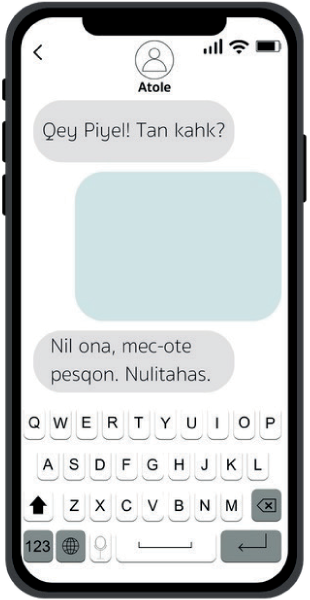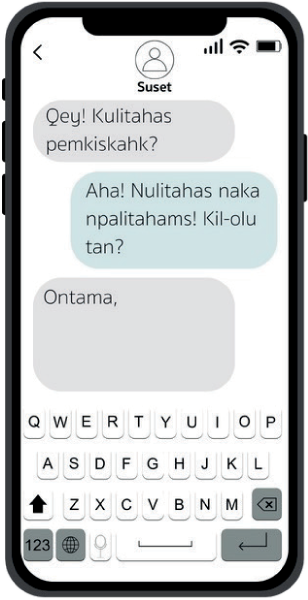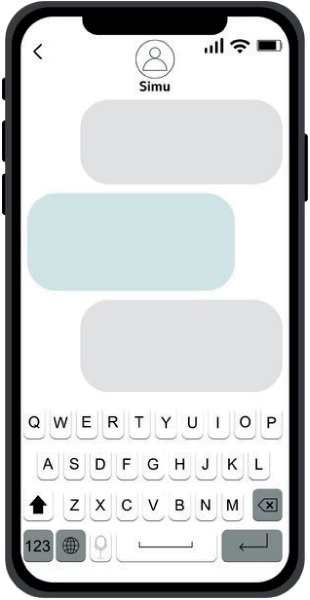

Home / Lessons / Level 1 / 5. Emotions
In this lesson, you will learn dialogues to discuss emotions and feelings. You will learn several vocabulary words to describe how people feel.
Instead of simply asking the question «Tan kahk olu kil ?» / How are you?, we can go further by asking more emotion-focused questions. The dialogue will reuse the prefixes (n - nil / me - I) and (k - kil / you - you). We can still use the full form (nil or kil) or the abbreviated form (n or k).
Example:
We can say «nil nulitahas» / «I am fine» or simply «nulitahas» / «I am fine». In the second case, the «n» at the beginning of the word indicates the first person singular (I).
Dialogue :
Question : Kulitahas ?  / Are you happy?
/ Are you happy?
Answer: Aha. Nulitahas !  / Yes, I am happy.
/ Yes, I am happy.
To be more precise when discussing emotions, it’s possible to use « how are you feeling » which allows for a greater variety of responses.
Dialogue:
Question: Tan ktolomolsin ?  / How are you feeling?
/ How are you feeling?
Answer: Nkosinuhk pemkiskahk.  / I am sick today.
/ I am sick today.
Other possible responses:
Nulomols  |
I feel good. |
Mocomols  |
I don’t feel well. |
Nulitahas  |
I am happy. |
Nkosinuhk  |
I am sick. |
Naskatahas  |
I am frustrated. |
Nkospon  |
I am tired. |
Ntoqes  |
I am ashamed. |
Npalitahas  |
I am proud (e.g., I am proud to be Wolastoqey). |
Npalitahams  |
I am proud (e.g., I am proud of myself). |
Nkotomakomols  |
I am sad. |
| I | You | He / She | English | |
|---|---|---|---|---|
Nulomols  |
‘kulomols  |
Wolomolsu  |
I feel good | |
 |
Ma-te nulomolsiw  |
Ma-te ‘kulomolsiw  |
Ma-te wolomolsiw  |
I don’t feel well |
 |
Eci-mocomolsi  |
Eci-mocomolsiyin  |
Eci-mocomolsit  |
Very sick |
 |
Nulitahas  |
Kulitahas  |
Wolitahasu  |
Happy |
 |
Nkosinuhk  |
‘kosinuhk  |
Ksinuhke  |
Sick |
 |
Naskatahas  |
Knaskatahas  |
Naskatahasu  |
Discouraged or frustrated |
 |
Nkospon  |
‘kospon  |
Kospone  |
Tired |
 |
Npalitahams  |
Kpalitahams  |
Palitahamsu  |
Proud |
 |
Nkotomakomols  |
Ktomakomols  |
‘tomakomolsu  |
Sad |
 |
Nuhkay  |
Kuhkay  |
‘qayu  |
Angry |
Answer the question based on the proposed image.
 Tan ktolomolsin ?
Tan ktolomolsin ? Tan ktolomolsin ?
Tan ktolomolsin ? Tan ktolomolsin ?
Tan ktolomolsin ? Tan ktolomolsin ?
Tan ktolomolsin ? Tan ktolomolsin ?
Tan ktolomolsin ? ‘Kulitahas ?
‘Kulitahas ? ‘Kulomols ?
‘Kulomols ? ‘Kosinuhk ?
‘Kosinuhk ? Ktoqes ?
Ktoqes ?Complete the dialogues between Peter and his friends.


Check in on your friends Louis and Simon. Ask them how they’re feeling, imagine their response, then bid them farewell.

Fill in the table with the Wolastoqey equivalents to the clues in English.
Additional information for exercises solutions may appear in the Appendix of the PDF document.